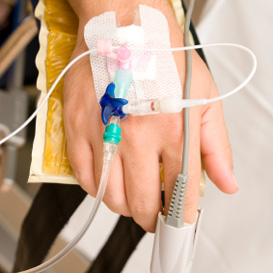Rapid Detox

Is a rapid detox program right for you?
Rapid detox is a drug detoxification process that is used to rid the body of physical dependence on opioids such as heroin, morphine or certain prescription medications. Proponents of rapid detox boast it’s ability to quickly, painlessly and efficiently detox the body from opioids. In fact, rapid detox is said to work in mere hours whereas a traditional opioid detox program usually lasts anywhere from a week to a month or more. With rapid detox, the withdrawal symptoms associated with opioid withdrawal are never felt by the individual because the entire process is performed while the individual is under general anesthesia.
How Rapid Detox Works
Rapid detox was developed by Andre Waismann an Israeli physician who specialized in anesthesiology. He started practicing the rapid detox method in 1994 and his method has since been introduced to many detox centers throughout the world.
Under general anesthesia, the addict is given a range of drugs that block the opiate receptors and then they are given a drug that blocks the opioids. The process takes about 36 hours to complete but while the patient is under general anesthesia they do not feel any of the withdrawal symptoms that they would feel with a traditional opiate detox program. The rapid detox eliminates the painful or uncomfortable withdrawal symptoms that an addict would normally experience by allowing them to go through these symptoms while essentially “asleep” under general anesthesia similar to being in a surgical setting.
Rapid detox is only performed in a medical environment under the care of a licensed physician. The entire process is completed while the patient has no recollection of what is going on. Following the rapid detox in a medical setting, the addict is prescribed naltrexone for a period of one year following the rapid detox. The naltrexone is used to block the opioid receptors so that even if a recovering addict does attempt to get high they drugs will not work and no high will be felt thus reducing the “fun” and preventing them from wanting to do so.
Does Rapid Detox Really Work?
Rapid detox can work for some people but is not right for all addicts. The reason is that although physical dependence on a drug is eliminated with rapid detox, the most successful outlooks on detox are followed by a long term drug treatment program and follow up care. Rapid detox can work wonders for those who attend the rapid detox, effectively eliminate the physical dependence on the drug and then follow up with a drug treatment program.
It is reported that 55% of the time, a relapse occurs within the 6 months following rapid detox. These numbers only include the relapse using the same opioid and do not include the use of other drugs or alcohol which would likely cause the numbers to be much higher. There are some physiological risks associated with rapid detox which should be discussed with the counselor and physician before making a final decision to enter into a rapid detox program.
Ultimately, rapid detox is just the beginning of what should be a long term addiction treatment program. For those wishing to go through the opioid detox process without feeling the negative and often painful withdrawal symptoms a rapid detox is perfect. However, the most important thing to consider is that rapid detox is not a means to an end but rather the very first step to opioid addiction treatment. If not followed with long term drug treatment, the chances of relapsing and using opioids again is very high.